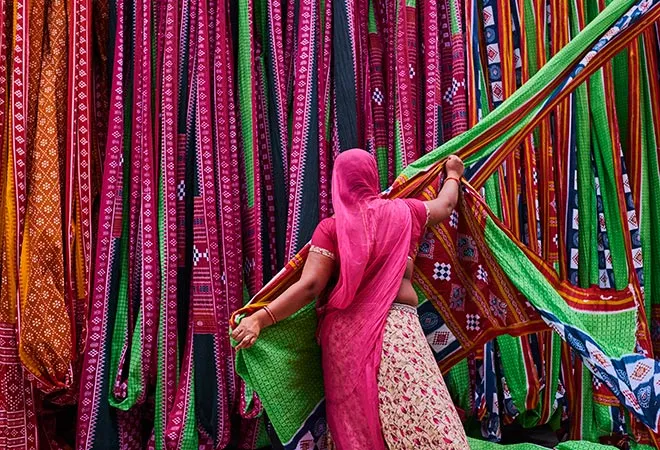-
CENTRES
Progammes & Centres
Location
In keeping the floor very low in the Wage Code Bill, the government seems to have succumbed to external pressure.

There seems to be a stream of bad news on the economic front. Export growth has contracted by 9.7% and is at its lowest in 41 months. In items of exports that India traditionally was a lead player in, others seem to be taking over. Close competitors Vietnam and Bangladesh have already exceeded India in the apparel sector with Vietnam posting high growth of 6.7% in it in the first five months of 2019. Bangladesh experienced double digit growth in the last financial year in garment exports. Indian exports of apparel have been stagnant since 2014-15. Obviously, India is losing out in competitiveness to smaller countries in labour intensive products which is worrisome as many women get jobs in the garment and apparel sector in developing countries.
With exports falling and industrial growth at 3.1% in May, there is reason to lose faith in the ‘Make in India’ campaign. There is talk about raising India’s competitiveness especially in labour intensive industry. Wages constitute an important part of the overall costs of an industry like apparel and garments. Many neighbouring countries cut corners and pay their workers very poorly and have dismal conditions of work and Bangladesh experienced a major disaster in the garments industry when safety norms were flouted resulting in the Rana Plaza garment factory collapse in 2013. As a result, 1,134, mostly poor women workers died.
There are other costs also that can make a labour intensive industry efficient but most neoliberal economists believe it is labour costs which need to be controlled. They have been waving red flags over any talk on having a national minimum wage. They feel the whole discussion of minimum wages should be left to the states and the Centre should not interfere otherwise it will affect employment growth. A national minimum wage according to them is restrictive and does not allow flexibility to the employers which affects their profit margins.
With around 500.9 million strong labour force, India has to think of protecting its workers against exploitation and undue hardship meted out by employers. Workers have a weak bargaining position and women workers are especially more vulnerable. For them a job means a lot and if they lose the job they lose their status and livelihood. A national minimum wage offers protection to workers especially women.
The 2019 Economic Survey has a long chapter on Minimum wages and has rightly pointed out that “a simple coherent and enforceable Minimum Wage System should be designed with the aid of technology as minimum wages push wages up and reduce inequality without significantly affecting employment. An effective minimum wage policy is a potential tool not only for the protection of low paid workers but is also an inclusive mechanism for more resilient and sustainable economic development.”
The debate about minimum wage and how it should be determined has been going on for years. The labour ministry appointed an expert committee to examine the question and it recommended a hike in minimum wage to Rs 375 per day as of July 2018. The panel comprising of seven experts had also recommended an amount of Rs 9,750 as minimum monthly wage and Rs 1,430 as an allowance for housing for workers in cities.
The minimum monthly wage was determined by the formula that a worker works for 26 days a month. The wage level fixed by the committee was irrespective of sectors, skills, occupations, and rural and urban locations for a family comprising of 3.6 consumption units. The daily spending estimates of a working class family was assumed to be an intake of 2,700 calories, with each person consuming 72 yards of clothes and incurring a minimum housing rent and education, light and fuel expenditure. This formula was set by the Indian Labour Conference of 1957.
The national floor level was last revised by 10% to Rs 176 a day in July 2017. But the floor recommendation of the central government is not legally binding on states. As a result different states have different minimum wages and some like West Bengal, Nagaland, Tripura and Tamil Nadu have been paying workers less than minimum wages.
But keeping in mind the industry’s point of view and overlooking the recommendations of the Expert committee and the Economic Survey, the Cabinet has approved a hike of only Rs 2 per month. This is going to be shocking news for the Trade Unions.
It will be shocking news for the workers also because as opposed to the committee’s recommendation of Rs 375 per day, they will have to accept Rs 178 per day as the new minimum floor level. The central government has thus chosen to ignore the Economic Survey and its suggestion that a simple coherent and enforceable minimum wage should be designed. Such system would reduce migration also.
Already, because of the states not paying workers according to the minimum wage set by the labour ministry’s national minimum wage, there is widespread difference in wages between the states leading to huge amount of migration.
The Central government has introduced a watered down Wage Code Bill 2019 in the Parliament recently aimed at only setting up a floor level below which states cannot fix minimum wages. There is progress towards a more simplified minimum wage code because from 2000 minimum wage variants, it has been reduced to 300. It will be applied to informal sector workers also. The government seems to have succumbed to pressure from neoliberals and business in keeping the floor so low.
This commentary originally appeared in The Tribune.
The views expressed above belong to the author(s). ORF research and analyses now available on Telegram! Click here to access our curated content — blogs, longforms and interviews.

David Rusnok Researcher Strengthening National Climate Policy Implementation (SNAPFI) project DIW Germany
Read More +